Fig Gin Gimlet + Chat with Bimini Gin Founder
My interview with Kristina Hansen Case, Co-founder of Round Turn Distilling and Bimini Gin, discusses the inspiration from her community and love for craft cocktails that helped launch her distillery and gin company.
After moving back to Maine from New York, Kristina Hansen Case and her husband, Darren Case knew they were ready to start their own operation. Through their persistence, hard-work, and patience they manifested their love for craft cocktails and local ingredients into a full-scale business. Round Turn Distillery is where they have their tasting room and also where they create their flagship product, Bimini Gin.
Bimini Gin is inspired by those warm, Summer days on the East Coast. The citrus-forward gin will remind you of being somewhere tropical with key botanicals like grapefruit zest, hops, and coriander seed. They feature four other gin expressions that will bring you back to sunnier days at the beach. The handcrafted and hand-bottled Bimini Gin is a modern American gin that’s perfect for your favorite cocktails.
Read the full interview below.
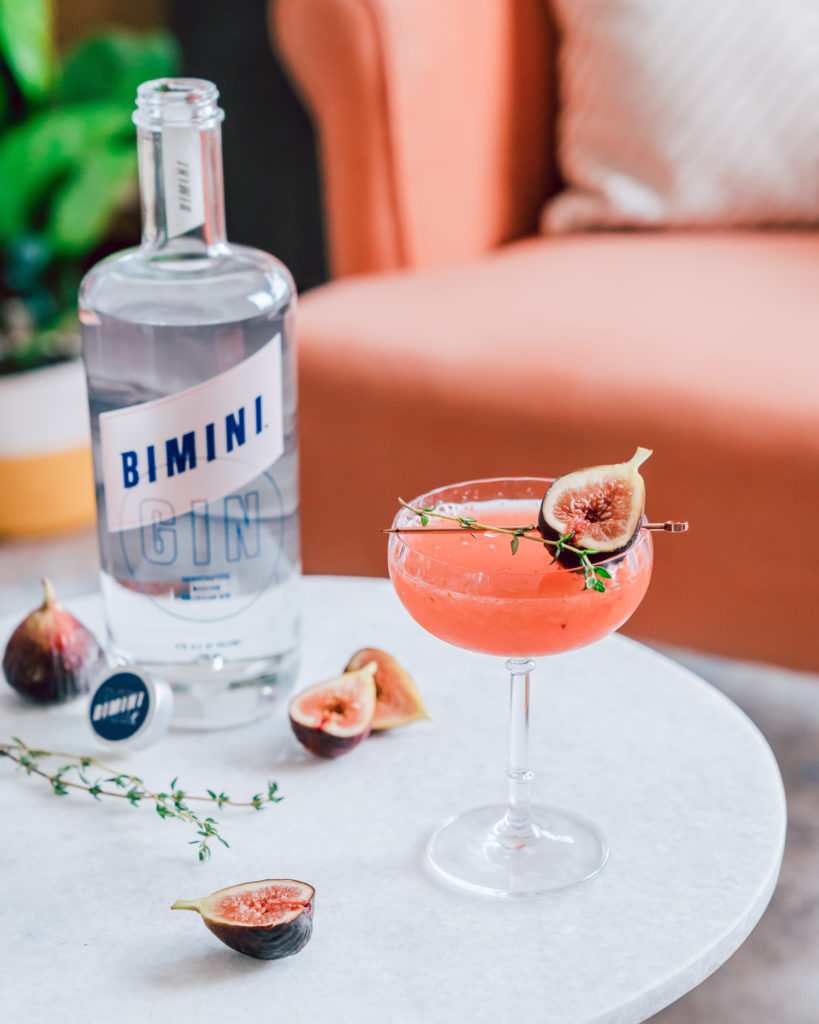
Carolyn: Tell me about how you got the idea for Bimini Gin and how it was created.
Kristina: “We were getting tired of the grind [in New York] and we were ready to move back up to Maine, to be closer to family. We figured if we moved back, we wanted our own business. There aren’t a ton of economic opportunities up here, it’s still a little bit of an older state. Basically what we did was look at our hobbies, which were eating and drinking, mostly going out. From there, we were able to narrow that down to craft cocktails with more interesting and small-batch ingredients. We would have conversations with bartenders and they would tell us about what’s in certain cocktails, how they make it, and what that does for a drink. We just built up a lot of hobbyist knowledge about different spirits and liquors, and so that sort of gave us an idea of something that we could try.
We’d always really enjoyed gin as a spirit, and we thought it was the most interesting because the flavor profile can be so wide, as long as Juniper is one of the chief botanicals, you can pretty much put anything else you want. We wanted Bimini to be the epitome of summertime drinking because the summers here are beautiful, they’re very short though. So, we wanted the brand to be a little bit more sunny, bright, refreshing, and have that paired with the flavor profile, which is a little more citrusy. It’s not that heavy, pine tree flavor.
The name Bimini comes from a Hemingway novel called, Islands in the Stream, and it’s actually set on the Island of Bimini in the Bahamas. One of the scenes in the story, the main character is drinking a delicious, refreshing gin cocktail on his boat, under the shade of the Bimini top, which is a canvas cover that shades the deck of the boat. That really summed it all up for us, it was all the notes we wanted to hit, so that’s where the name comes from.”
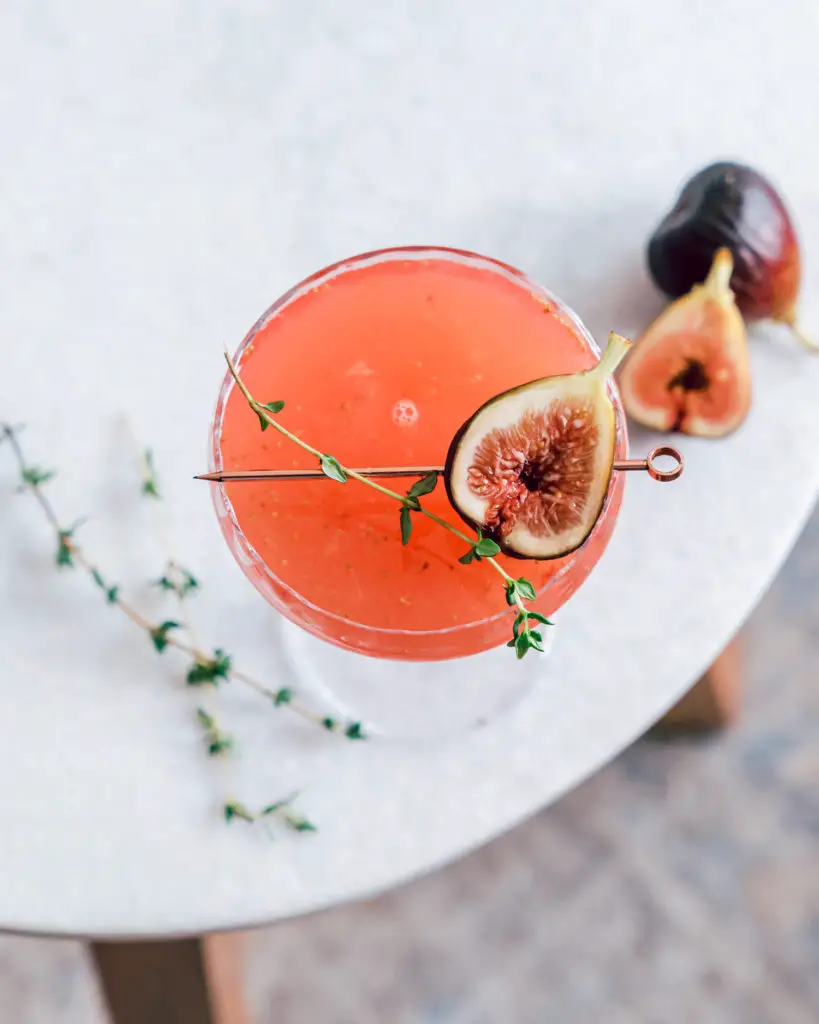
C: It’s almost like a tropical-feeling gin. So, that’s something that sets you apart. How did you specifically develop these flavors?
K: “We spent about a year and a half working on the recipe, trying to dial in exactly what we wanted, and we really did want it to be user-friendly. It has strong, unique flavors, if you had it, you know it’s Bimini Gin in the cocktail. But, it still tastes like a gin cocktail and it’s not too far off in one direction. It’s a nice balance. Because of that, we have found it works well in fruitier, tropical drinks, and we actually just launched our fourth expression of the gin, which is a coconut flavor… It’s an all-natural coconut oil infusion, there are no sweeteners, no flavorings. The tropical vibe does play into the branding as well.”
C: What’s your favorite way to enjoy it, or what cocktail do you personally love with your gin?
K: “We really like martinis, just really simple and clean. I will say we do a couple of more complicated or tropical-style drinks in our tasting room, with a lot of ingredients, a lot of strong fruit flavors, a Saturn is probably a favorite, that’s a classic tiki cocktail, with passionfruit, lime, and lemon. It’s really, really nice.”
C: You shared that it took about a year and a half to perfect that first [gin] recipe, what was your journey like from that first year until now?
K: “We actually started the whole flavor process while we were still living in New York. When we lived in Northern Brooklyn and Greenpoint, there was a very large Polish population there, so all of the little corner bodega liquor stores carried this neutral Polish spirit, which is the base for a lot of gins. You want to start with a really pure neutral alcohol and then re-distill that with the botanicals to extract the flavor oils out of it.
For us, we were actually working with little mason jars in our apartment, doing infusions of different herbs and spices, we tried probably 40-50 different things altogether, and then we were mixing them together with little medicine droppers and different ratios and seeing what worked well. It took us about a year and a half to really focus and dial it in, and then once we had that, then we started the plan of coming back up here [to Maine] and opening up our space, which took another year or so.”
C: Have you and your husband started a business before?
K: “Before we came back up here, the last year and a half or so in New York, I had been working for myself, running a jewelry company. I had worked as a studio manager for a jeweler in the city and then she decided to move on and I took the opportunity to launch my own stuff… So, I was used to setting my own schedule and being responsible for everything, which at times can be sort of overwhelming. You have to run framework, which is something that is definitely translated into this business as well, just sort of figuring out what needs to happen when it needs to happen, and trying to keep a lot of irons in the fire all at once, because it still is just the two of us for almost everything, we have a very small tasting room staff, but all the production, marketing, sales, things like that is just my husband and I.”
Credit: @roundturndistilling Instagram
C: What role do each of you play?
K: “We do the first half of production together, and then as far as the distillation goes, he runs most of that, I’ll sort of take over for shifts, he usually starts and ends, and I’ll do something sort of in the middle. Then he handles a lot of the boring paperwork, we have to keep daily reports and file things monthly, weekly, and quarterly. I do a lot of the administrative stuff, like running payroll, doing all the book-keeping, all the shopping, stocking up, things like that. I also manage the tasting room and the staff there too.”
Credit: Credit: @roundturndistilling Instagram
C: How has the pandemic affected you and your tasting room? What’s happened?
K: “It’s been a very interesting six months. In Maine, it came a little bit later… So, we had a little bit of time to see what was going on in other places and we could tell that it was coming. We were open as a bar six nights a week doing cocktails and we have a little retail shop that we sell bottles, shirts, hats, and things like that and we actually made the decision to close that down voluntarily about three or four days before the state put restrictions in place. So, what we did was we just pivoted to an all-retail model and we closed the tasting room. We were doing all online pre-orders and curbside pick-up. We actually started doing a lot of our cocktail mixes and pre-made bottles for people to have cocktails at home, which sustained us pretty well. The first month or two were actually better than previous years because no one really knew how long this was actually going to last. Once people realized, ‘oh, this isn’t changing,’ it started to trend down a little bit, but we still had a pretty good tourist season on the coast of Maine.
Fortunately, we were able to keep the doors open mostly, and then we actually were able to shift back in July to allow in-store shopping, so we basically just became a store. We got a bunch of new merchandise because we couldn’t do just drinks really with our particular license and we just sort of shifted again to just a regular retail store, so we have a lot more items than we previously carried.
Now, it’s getting cold, so people aren’t really too interested in the outdoor dining that’s going on. We’ve been able to take advantage of some sort of public food court space that has been organized. We have actually been able to start doing drinks to-go. Again, it’s that semi-retail model, You can buy it and take it somewhere else.”
C: What other ways do you spread the word about your tasting room and your products in your business, where is your primary focus?
K: “We do focus a lot on Maine, it’s our home state, but we do distribute to 12 other markets right now. We’re in California, we’re focused on the greater L.A. area and then the Bay area. We actually work with a really cool distribution company out there who is sort of half distributor, half salesforce. So it’s actually like a co-op situation and we’re able to be in a very small, strong portfolio of all craft, family-owned brands. It’s a nice portfolio to be in because everyone has the same sort-of aesthetics and ideas about what makes something good.”
C: Do you use social media to let people know or market your products? Or other advertising or promotions?
K: “Yeah, I would say the majority of our marketing is Instagram and Facebook. We do have pretty good word-of-mouth advertising, mostly in Maine, it’s a pretty small state, and there’s really only one big city with smaller cities 20 minutes away from it, so it’s a very concentrated population.
We have been able to do a few collaborations with different brands or local people who are their own brands and want to expand the reach of other companies, like travel blogs or food-focused collaborations, and nonprofits… We never did much in terms of traditional marketing and advertising, I think we’ve put one or two ads in the local paper, maybe hours that changed the second year we were open, but it’s mostly online. A lot of our customer base is pretty tech-savvy that way, and also it’s nice for us because particularly this year with everything changing so frequently, it’s nice to be able to have that sort of immediate information to let people know.”
C: Maine has a pretty big mixology scene, right?
K: “It does, most of the food culture is based in Portland, Maine which has gotten a lot of great press the last three, four, or five years. There’s a lot of travel and food writing going on… Eater articles, Punch, or Travel and Leisure, and New York Times articles.
I feel like that sort of helped people look at it a little bit more deeply and say, ‘oh, there is cool stuff to do there, it’s not just lobsters and people! I feel like Maine is a wonderful community because everyone is really interested and invested in using local ingredients…It is all local handmade artisanal in one way or another.”
Credit: http://www.roundturndistilling.com/
C: What has the journey been like? And how has the experience of starting a business with your husband been for you?
K: “It’s been great, particularly working with my husband. If he would have done this with a different business partner, he would be working just as hard, just as long of hours and we would probably never see each other, so at least this way, we’re both here in the same building, seven days a week because we’re working in the same company, so that has been nice. It’s also one of the more challenging parts of it because you literally are never apart.
But, as far as the business itself goes, it’s been really interesting, we did rather naively, assume that we might be a little further along than where we are now, just because it didn’t occur to us how expensive and cliquey the larger liquor market can be. There are huge international conglomerates that own 94% of the market share, and they have a lot of money and influence to throw around, and so they try to prevent companies like us from having space on a back bar at a really well-known restaurant or something like that. So, that has been tricky and a little demoralizing because we’ve had bar managers say, ‘this is delicious, I can’t buy it, I’m sorry.’ That’s probably the biggest drawback of everything. It’s great to be a small company and have a small product that you’re really proud of and is really high quality and you have very tight control over it, but, you’re kind of always gonna be the underdog.
With food and beverage, it’s really all about volume, your margins aren’t super high, it’s not exactly straight retail, like apparel or something and so being able to get the word out ourselves has been one of the best ways that we have been able to find new customers – a lot of interpersonal relationships at bars and restaurants seem to be the way to make your way in. I did say that about the larger companies, but there are, of course, awesome people in food and beverage who don’t want anything to do with that and refuse to stock a lot of those things, and so those are the kind of people that we’ve been able to form really strong relationships with mutually supportive to celebrate something that’s nice and worthwhile. Obviously, you can’t blanket the world with something when you’re our size, but it has been able to help us get a better sense of who actually cares and wants to have a product like ours because they know where it comes from, they know who makes it, they know what’s in it. So that’s the sort of connection you’re not gonna get from the larger company.”
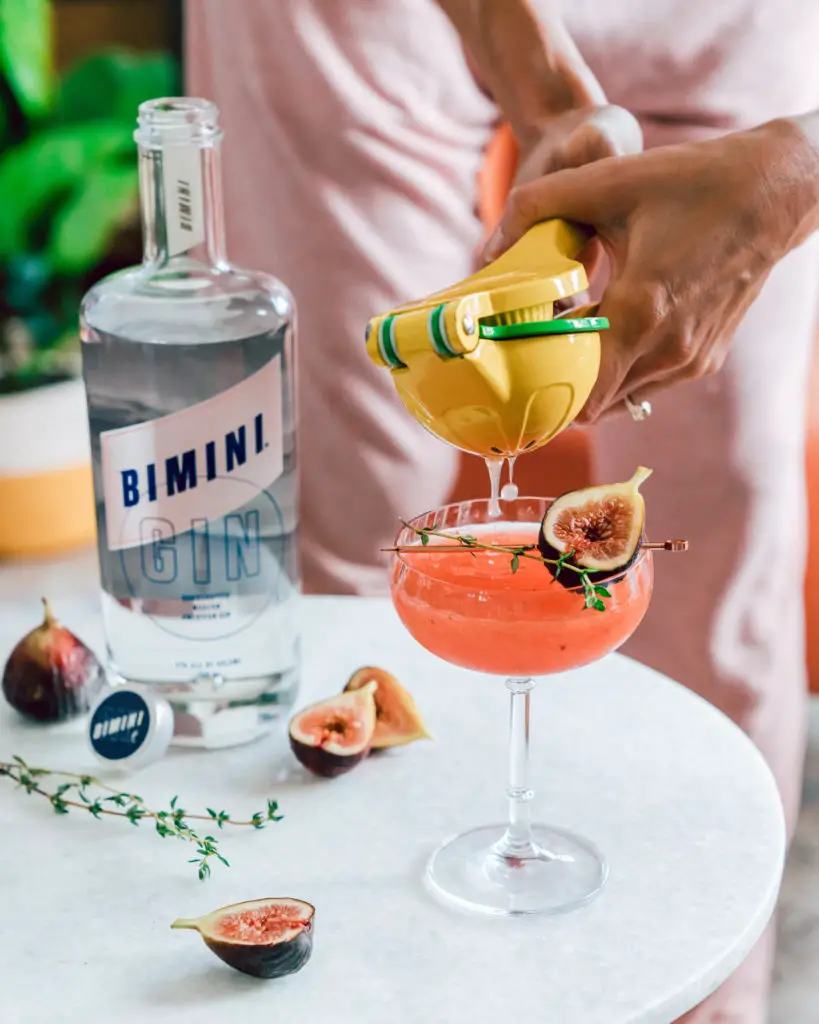
C: What are you working on or focusing on for the next steps?
K: “We’re going to push the newest product. We do have ideas for other ones down the line, particularly our barrel-rested gins. Our original one is one that we’ve made a few times now, we’re talking about four batches of it and that uses the same blend of bourbon barrels, but we are interested in expanding that line and using some other barrels to see what sort of secondary characteristics we get out of them. So that’s something that’s been on the back burner for a while. But right now, we are interested in getting the Coconut Gin to market, we really only launched it about three weeks ago, and just sent the pallets out to New York and California last week.
C: Is there any advice that you were given when you were starting off that was very valuable to you?
K: “Absolutely. Actually, it came from the head of another really successful distillery out in California. We had a mutual friend, we were able to go out there and just pick their brain and their advice was, ‘don’t do this, it’s too hard, there are too many gins, the market’s totally saturated.’ But if you choose to do this, make sure you have something unique to say.’
That really helped us figure out exactly what we wanted the gin to be. It really made us get a really narrow focus and direction which I think is really helpful. It takes a long time to develop what you think is the perfect product, and some people maybe use less time than others, and we’re sort of perfectionists, which can be a good thing and a bad thing, and so for us, we really took that advice to heart and really made sure what we were doing was absolutely what we wanted to put our stamp on it. And just being able to really narrow your focus down so you know your product inside and out, it makes it easier to sell in a way because you just absolutely believe in it. It’s real enthusiasm.”
C: Would you give that same advice? Or what advice would you give to someone looking to start their own business?
K: “I wouldn’t give similar advice…There’s a lot of regulation and oversight, so you have to be really well-versed in a lot of different laws and legislations, you have to be the kind of person who is comfortable and capable of researching and answering your own questions, there’s not a lot of resources out there. Honestly, the books that we were reading to get an idea of the just mechanics of how a lot of these looks were published pre-prohibition, there’s not a lot of new information out there. For this industry specifically, I’d say that you really have to be sort of an expert, problem-solver, and knowing that you have to figure out pretty much everything on your own. And I guess it’s also connected to just being able to play a lot of roles, so in addition to that, just being able to adapt to it, not always just the fun stuff, like tasting.”
C: Is there anything else that you want to share with our community?
K: “We found after talking with customers in person or in our tasting room, that a lot of them are really intimidated by home cocktail making. They think it’s really complicated, or they’re gonna mess it up. They don’t know what they like, what to do, they have no idea how to mix, or what ratios to use, or what they need to buy. They think they need all the special equipment and I feel like the best way to demystify that is to just start with the basics, something really easy. See how many different ways you can mix it or just pick a favorite flavor and work backwards. That’s what we did with making the gin, it was just mason jars and medicine droppers, so you can start really small and see how it tastes. If you like it, make a bigger one. It can be fun, it doesn’t have to be this intimidating thing.”
Bimini Fig Gin Gimlet
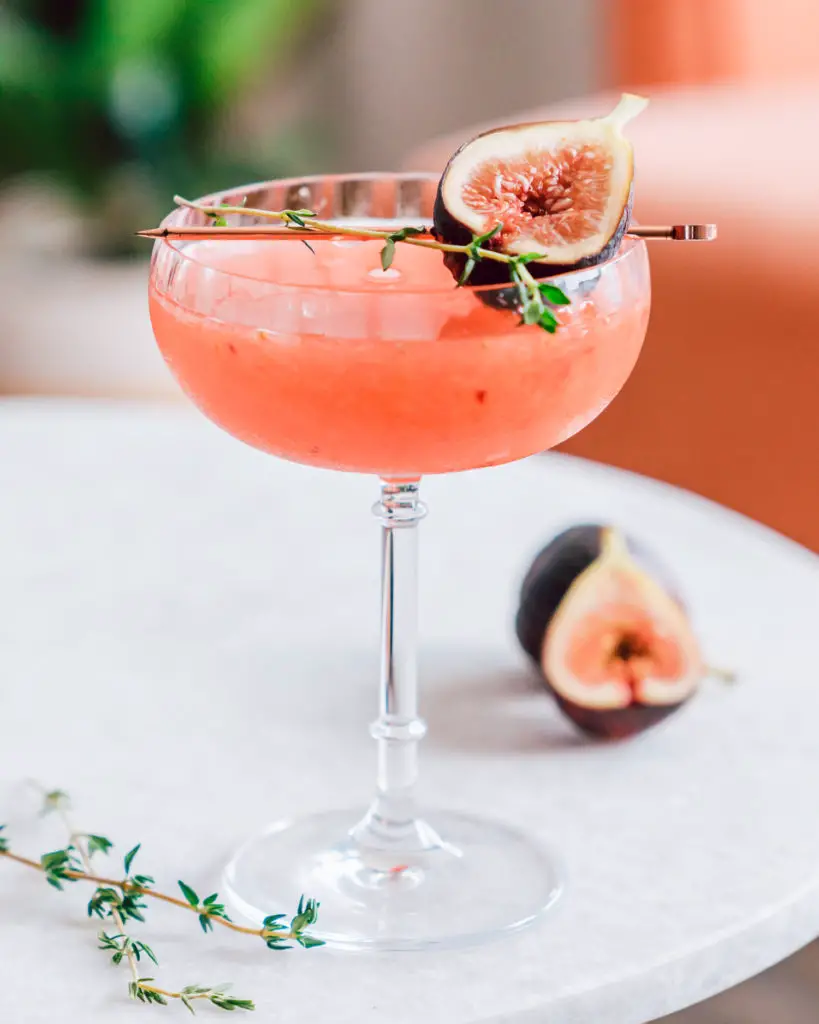
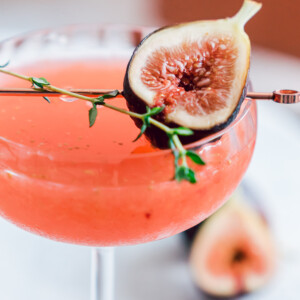
Fig Gin Gimlet
Ingredients
- 1 fig
- 1 sprig fresh thyme
- 1 lime, juiced
- 2 oz Bimini Gin
- ½-¾ oz simple syrup
Equipment
- Strainer
Instructions
- Add fig, thyme and lime juice to a cocktail tin and muddle.
- Add Bimini Gin, simple syrup and ice and shake. Strain into a coupe.
- If desired, garnish with fig and thyme.




